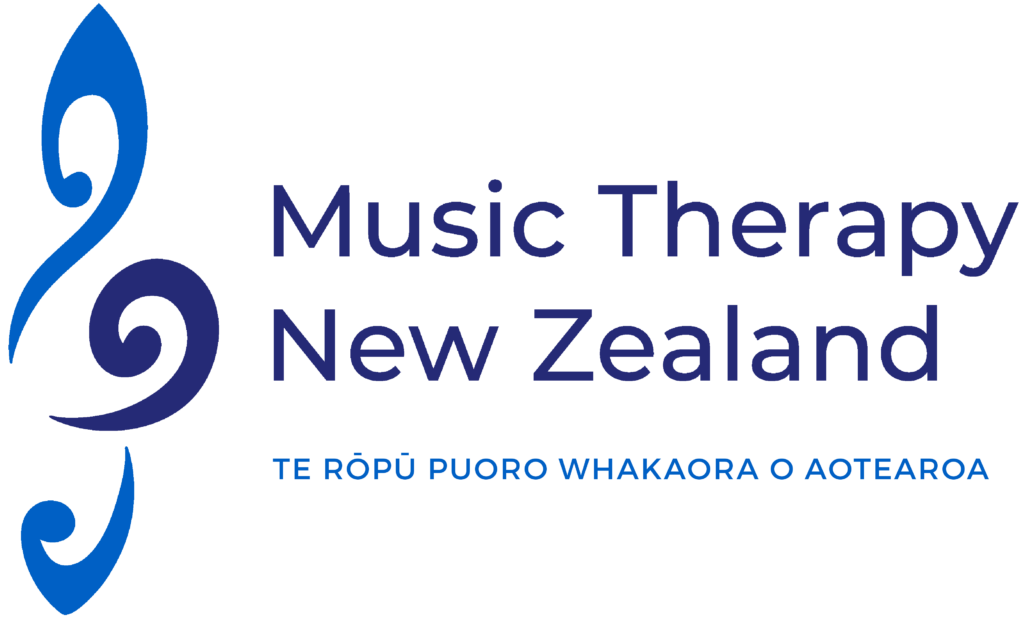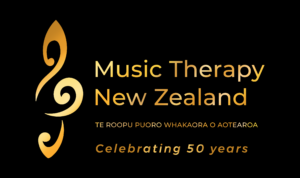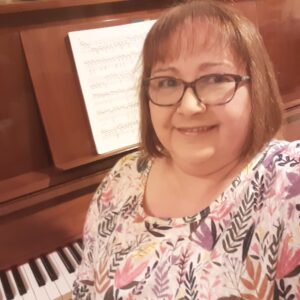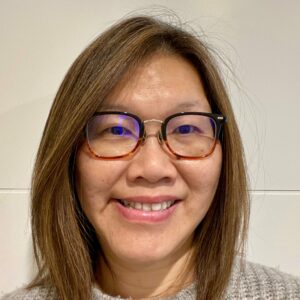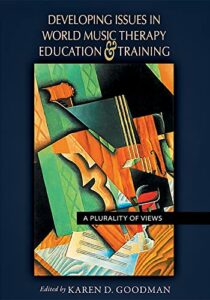New Zealand Journal of Music Therapy 21 (2023)
The full issue of the journal will published online in mid-December. Selected content may be published early online.
A print edition will be sent to MThNZ members in January. For MThNZ membership options (RMTh, Student, Friend, Retired, and Corporate) click here .
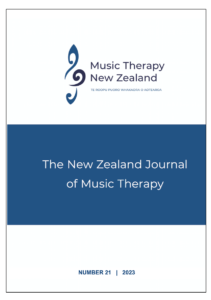
ISSN 1176-3264 (Print)
ISSN 2744-631X (Online)
Editorial
The Times They are A-Changin’
Alison Talmage & May Bee Choo Clulee 吳美珠
Our title refers to a time of looking back and ahead, while being present in the here-and-now. Bob Dylan’s (1963, 2019) song resonates 50 years on in 2023,a year of ever more transitions but also celebrations…
Download Editorial as pdf or docx.
Theses and Publications Alert
Editorial Team
Editor: Alison Talmage
Assistant Editor: May Bee Choo Clulee 吳美珠
Image Accessibility Adviser:
Áine Kelly-Costello
NZJMT Advisory Panel (2023):
Helen Dowthwaite NZ RMTh
Nolan Hodgson (Ngāi Tūhoe, Ngāti Awa) NZ RMTh
Assoc Prof Sarah Hoskyns NZRMTh
Neil Jourdan NZ RMTh, Chair, Registration Board
Adjunct Prof Daphne Rickson NZ RMTh, MThNZ President Emeritus
Penny Warren NZ RMTh
Editorial Advisers (2023):
Ajay Castelino
Helen Dowthwaite
Laura Halligan,
Angela Ah Young Jeong 정아영
Karen Twyford (Australia)
Disclaimer:
Statements of fact and opinion in articles published by NZJMT are those of the respective authors and contributors to the journal, and not those of NZJMT or Music Therapy New Zealand. Neither NZJMT nor MThNZ can accept legal responsibility or liability for errors or omissions that may be made. Readers should make their own evaluation of the appropriateness of any research and practice methods described.
Privacy Notice:
The journal is published in good faith. Inquiries (including take-down notices)
should be sent to the Music Therapy New Zealand Executive Officer: info@musictherapy.org.nz
Professional Practice & Research
Note, professional practice and research articles are anonymously reviewed anonymous reviews by two (occasionally three) peer reviewers.
Working it out Together: Helping Community Support Workers and Family Members to Use Music to Benefit Adults with Learning (Intellectual) Disabilities
Liz Wallace
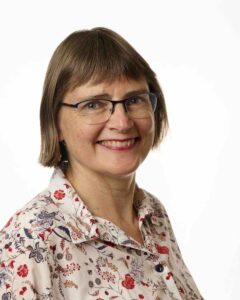 Abstract: This article describes the development of a music therapist’s collaborative work with community support workers and family members to use music to benefit adults with learning (intellectual) disabilities. Examples of collaborative work are given, which show how individually tailored music ideas can improve wellbeing, enhance relationships with community support workers and family, and increase participation in the wider community. This type of collaborative work is recommended as a valuable way music therapists can use their professional skills to help others to use music to benefit adults with learning (intellectual) disabilities.
Abstract: This article describes the development of a music therapist’s collaborative work with community support workers and family members to use music to benefit adults with learning (intellectual) disabilities. Examples of collaborative work are given, which show how individually tailored music ideas can improve wellbeing, enhance relationships with community support workers and family, and increase participation in the wider community. This type of collaborative work is recommended as a valuable way music therapists can use their professional skills to help others to use music to benefit adults with learning (intellectual) disabilities.
Download article as pdf or docx.
Music, Making, and Meaning: Megan and Me, A Reflection on Practice from Music Therapy in Palliative Care
Libby Johns
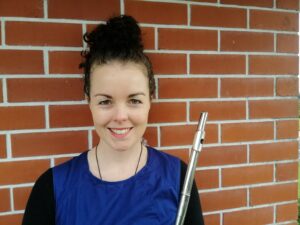 Abstract: This case study is about Megan’s music therapy journey, as part of her palliative care at Hospice West Auckland. Using first person reflective writing I wish to promote the use of reflexivity and positionality in practice and publications. My reflections aim to capture the essence of how Megan and I worked together in music therapy sessions and highlight the need for flexibility while working in palliative care in a Hospice setting…
Abstract: This case study is about Megan’s music therapy journey, as part of her palliative care at Hospice West Auckland. Using first person reflective writing I wish to promote the use of reflexivity and positionality in practice and publications. My reflections aim to capture the essence of how Megan and I worked together in music therapy sessions and highlight the need for flexibility while working in palliative care in a Hospice setting…
Download article as pdf or docx.
Community Voices
Note, Community Voices articles receive an open review.
“Comfort like home food”: Gayageum (가야금) in Dunedin
Hyunah Cho 조현아
 Abstract: This article describes the possibility of the therapeutic use of gayageum 가야금 for Korean people in New Zealand. During my time in Dunedin (2016-2022), I performed gayageum music for Korean New Zealanders. Conducting informal interviews, the majority of participants experienced feelings of “comfort”, “relaxation”, and “home”. These findings suggest two conclusions: (1) gayageum music can be a resource for New Zealand music therapy practice with first-generation Korean immigrants; and (2) the possibility of studying the diasporic meaning of gayageum in New Zealand.
Abstract: This article describes the possibility of the therapeutic use of gayageum 가야금 for Korean people in New Zealand. During my time in Dunedin (2016-2022), I performed gayageum music for Korean New Zealanders. Conducting informal interviews, the majority of participants experienced feelings of “comfort”, “relaxation”, and “home”. These findings suggest two conclusions: (1) gayageum music can be a resource for New Zealand music therapy practice with first-generation Korean immigrants; and (2) the possibility of studying the diasporic meaning of gayageum in New Zealand.
Download article as pdf or docx.
Download colour version of Figure 2 as pdf or png.
Book Reviews
Developing Issues in World Music Therapy Education and Training:
A Plurality of Views (2023)
Edited by Karen Goodman (Charles C. Thomas Publisher)
Reviewer: Penny Warren
Overall, this book offers an eclectic and often engaging collection of views and perspectives of music therapy education and training. Readers have the freedom to align themselves to a diversity of values and orientations, whilst still identifying with the collective music therapy community, without the hardened edges that can create distance and conflict (Chapter 1). I recommend this book to music therapy practitioners, students, educators, and anyone who has an interest in music therapy training and education.
Download review as pdf or docx.
Music and Dementia: From Cognition to Therapy (2020)
Edited by Amee Baird, Sandra Garrido & Jeanette Tamplin (OUP)
Reviewer: Alison Talmage
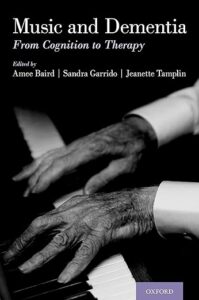
 This book is both a theoretical and practical resource that expanded my knowledge of contemporary approaches. I was heartened by the links between theory, research, and practice, as well as the mainly accessible style. Consequently, I recommend this book for everyone seeking a greater understanding of music therapy for people living with dementia or aiming to incorporate music into their own practice.
This book is both a theoretical and practical resource that expanded my knowledge of contemporary approaches. I was heartened by the links between theory, research, and practice, as well as the mainly accessible style. Consequently, I recommend this book for everyone seeking a greater understanding of music therapy for people living with dementia or aiming to incorporate music into their own practice.
Download review as pdf or docx.
